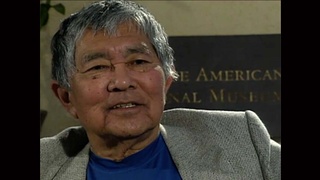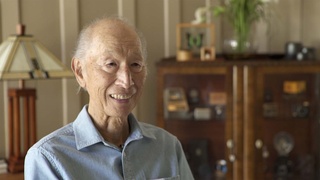Interviews
Under suspicion after Pearl Harbor
As I recall, it wasn't that, I didn't feel that mixed up. I think our loyalties were clear. We're Americans, and we'd try to do our best. And, but there was discrimination in the sense that those of us of Japanese ancestry were more under suspicion. We couldn't take national defense jobs. My friends, my older friends who were in the National Guard were kicked out, unceremoniously. We were classified 4-F and so on. And so it wasn't a happy time. Of course, no one was happy in those days. But in Hawaii we were fortunate in we had friends, non-Japanese, who, I think, stuck up for us and helped a great deal in easing the tensions.
Date: March 19, 2004
Location: California, US
Interviewer: Mitchell Maki
Contributed by: Watase Media Arts Center, Japanese American National Museum.







